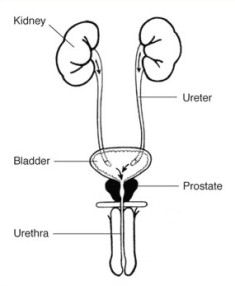 |
|
PROSTATE HEALTH Alternative Treatments and Prevention from AMAZON HERBS® 
|
 |
| Follow us online |
| |
|
The prostate gland is part of the male reproductive system; it wraps around the
urethra, (the tube that carries urine out of the body). One of its important roles is to squeeze fluid into the urethra as sperm move through during sexual climax. This gland is responsible for male sexual function and reproduction. It is walnut-shaped, located just below a man's bladder and starts to become active in near puberty and continues to grow. This enlargement usually does not cause symptoms until after age 40, and normally does not cause problems until age 60 or later. The three most common disorders are benign prostatic hyperplasia (BPH), a noncancerous enlargement of the prostate; prostatitis, an inflammatory infection (there are 4 types); and prostate cancer. In many men, the prostate gland may continue to grow when they are in their 50s. This continued growth of the prostate is referred to as BPH (enlarged prostate). 50% of men over the age of 50 have an enlarged prostate. However, this problem does not raise the risk of prostate cancer.  An enlarged prostate, although very common, is problematic because it presses on the urethra, creating difficulties
with urination and weakening the bladder.
An enlarged prostate, although very common, is problematic because it presses on the urethra, creating difficulties
with urination and weakening the bladder.Urinary problems due to BPH, can, with lifestyle changes, being relieved and should be tried first. These include going to the bathroom when the urge is first noticed, reducing or eliminating the intake of alcohol and caffeine, and limiting fluid intake before bedtime. Prostate cancer is the third most common cause of death from cancer in men and is the most common cause of death from cancer in men over age 75. Prostate cancer is seldom found in men younger than 40. The cancer develops when normal prostate cells turn cancerous (malignant) and divide at an unreasonable rate. It most often develops in the region of the prostate closest to the rectum. There are basically no warning signs for early prostate cancer. Some may experience symptoms similar to those associated with BPH (urinary frequency, urgency, pain with urination, etc.) or a urinary tract infection (UTI). |
|
Conventional Therapies for BHP Finasteride (Proscar), terazosin (Hytrin), doxazosin (Cardura), and tamsulosin (Flomac). These pharmaceuticals aim at blocking DHT production or relaxing the prostatic urethra sphincter. Specifically, finasteride (Proscar) inhibits the production of dihydrotestosterone (DHT), while the others force smooth muscle relaxation of the prostate and bladder neck. Nonsurgical treatments include transurethral microwave procedures (TUMT) and transurethral needle ablation (TUNA). Surgical treatments include open, laser and transurethral (TURP) surgery. These treatments remove or destroy sections of the prostate gland. Proscar has been shown to shrink the prostate and reduces the need for surgery. However, all of these above mentioned medications can cause significant side effects. Proscar (Finasteride) may cause serious side effects including severe or ongoing nausea, difficulty breathing, swelling of your face, tongue or throat. Herbal Dietary Supplements (herbal tinctures & botanicals) from the Amazon rainforest. Botanical, nutritional therapies and herbal tinctures focuses on decreasing the size of the prostate gland, preventing abnormal cell growth, and supplying the gland with nutrients to decrease the risk of infection, while maintaining hormonal balance to preserve the gland as a whole. Natural medicines that contain beta-sitosterol (ß-sitosterol), are very effective in reducing enlarged prostates in BPH patients and significantly decrease BPH symptoms. Beta-sitosterol may be a good treatment option for men with mild to moderate BPH; it may relieve the obstruction and improve urine flow and BPH symptoms. It is found in fruits, vegetables, nuts, and seeds, such as soybeans, peanuts, corn- and olive oil. Plant oils have the highest levels of beta-sitosterol. Trials have reported preliminary efficacy of beta-sitosterol in the treatment of voiding symptoms related to BPH and demonstrated improvement in symptoms such as flow rate and decreased post void residual urine volume. Tropical botanicals used are: Acai: contains besides beta-sitosterol; anthocyanins and proanthocyanidins. These last two are strong antioxidants Bixa orellana: has anti-inflammatory, diuretic and antibacterial properties; works against complaints regarding the urinary and reproductive areas, from cystitis to prostatic disorders. Cat's claw: strong stimulant of the immune system. Coffee: According to research, for the men who drank the most coffee, the risk of getting the most deadly form of prostate cancer was about 60 percent lower. Curcumin: has prostate cancer–protective activity. It appears to be safe in the treatment of all cancers, and has been shown to be nontoxic. It may help slow down tumor growth in prostate cancer patients and effectively blocking the growth of established castrate-resistant prostate tumors. Garlic: gives significant improvement in urinary symptoms, such as enhanced urinary flow and decreased urinary frequency. The size of the prostate gland was reduced in the BPH. Ginger: this is a natural immune system booster; the extract had significant effect in stopping the growth of cancer cells, as well as in inducing cell death in wide range of prostate cancer cells. Gossypium: the constituent gossypol inhibits the function of cells in human prostate tumors and makes the cancer more sensitive to radiation therapy and chemotherapy. It may increase apoptosis (programmed cell death). Neem: contains nimbolide, a terpenoid compound; it may shrink prostate and suppress metastasis. Pao pereira: bark extract has strong activity against human prostate cancer. It significantly suppresses cell growth in a dose-dependent fashion and induced apoptosis. Papaya: rich in antioxidants, vitamin A, vitamin C, vitamin E, cartenoids and flavonoids, prevents prostate cancer and enlarged prostate. Phyllanthus: cytotoxic effects of extracts of Phyllanthus species (P.amarus, P.niruri, P.urinaria) against prostate cancer cells. It also treats UTI (urinary tract infection) and prostatitis. Pumpkin seeds: the seeds contain diuretic properties and lots of zinc. This helps repair and build the immune system and may reduce enlargement. Puyang: the phyto-chemical zerumbone has shown very potent anticancer and anti-tumor activity. |
|
For translation use The Google Language Tools
|
|
The above presentation is for informational and educational purposes only. It is based on scientific studies (human, animal, or in vitro), clinical experience, or traditional usage. For many of the conditions discussed, treatment with prescription or over - the - counter (OTC) medication is also available. Consult your doctor, practitioner, and/or pharmacist for any health problem and before using dietary supplements or before making any changes in prescribed medications. |
All the information in this database is for education & information purposes
only! |
| TROPILAB® INC. P.O.BOX 48164 St.Petersburg, Florida 33743 - 8164. USA. Phone: (727) 344 - 7608 Toll free: (877) 808 - 9410 (for ordering only) |